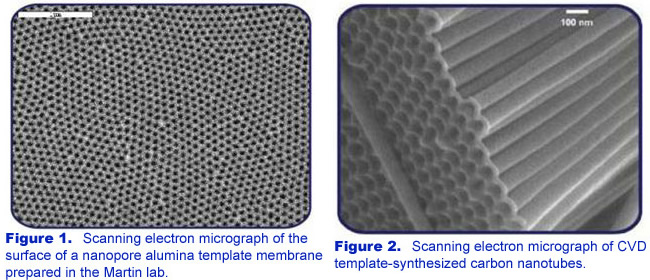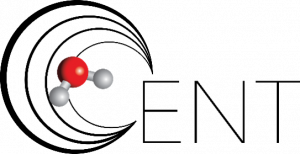Research
Research in the Martin group is conducted at the interface between analytical chemistry and materials science.
This entails developing new approaches to do chemical analyses and separations and developing the new materials that will make these separations and analyses possible. We are particularly interested in the application of nanomaterials to bioanalytical chemistry. In general, the nanomaterials research area entails preparation of nanoscopic particles of a desired material, characterization of the fundamental properties of the nanomaterials obtained, and development of practical applications of nanomaterial-based systems. Our group has pioneered a powerful new method to prepare nanomaterials called the “template method.” This method entails using the nanoscopic pores in a host membrane (Figure 1) as templates to prepare monodisperse nanoscopic particles of a desired material.

Nanotube Membranes
Nanotube membranes (Figure 2) prepared via the template method are of particular interest. These are synthetic membranes that contain a parallel collection of nanotubes with inside diameters that can be of molecular dimension (< 1 nm). We are exploring applications of these nanotube membranes in chemical analysis and in membrane-based chemical separations. For example, we have shown that these membranes can be used as filters to cleanly separate small molecules on the basis of molecular size -“molecule sorters.” We are also using these nanotube membranes for protein separations. Furthermore, we have shown that these nanotube membranes can form the basis of a new method of electrochemical analysis that has detection limits as low as 10-11 M. This work was featured in a cover story in Chemical and Engineering News.
In both the applications to chemical analysis and chemical separations, it is important to introduce chemical selectivity into the nanotube membrane. Ideally, the membrane should show molecular-recognition capabilities; that is, it should be able to identify and extract a particular target molecule and ignore all other molecules present in a contacting solution phase. One approach to developing such ideal molecular-recognition membranes is to immobilize biochemical molecular-recognition agents within the nanotubules. Biochemical molecular-recognition agents being explored include enzymes, antibodies and other proteins and DNA. This bio/nano research effort is of particular importance in our group, and Professor Martin is the Director of the University of Florida’s Center for Research at the Bio/Nano Interface.
Electrochemical Energy Production
We are also interested in electrochemical energy production, and nanomaterials play a major role in our research efforts here also. We are investigating new nanostructured electrodes for Li-ion batteries – the type of battery that powers modern laptop computers and cellular phones. We have shown that because of the very high surface area of nanomaterials, the nanostructured electrode can support much higher discharge currents without loss of battery capacity. Finally, we are also conducting research on carbon nanotube membranes, corrosion, and basic electrochemistry.

